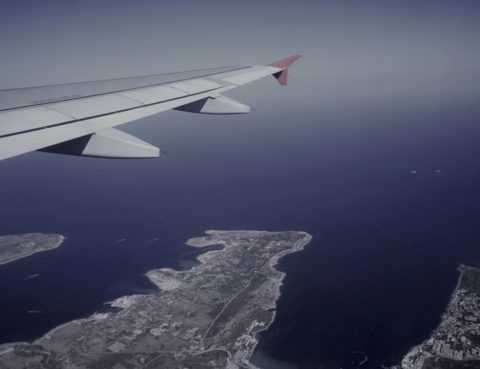Malta is about to become more connected than ever to the United States. Starting next summer, Delta Air Lines will operate direct flights between New York’s John F. Kennedy International Airport (JFK) and Malta International Airport (MLA), a development hailed as a major milestone for the island nation. The seasonal service, scheduled to run three times a week between June and October on a Boeing 767-300, will mark the first-ever nonstop connection between Malta and the United States.
For U.S. nationals considering applying for residence or citizenship in Malta, this new route makes the journey easier, faster, and more attractive.
A Boost for U.S –Malta Connectivity
The announcement underscores the growing cultural and economic links between Malta and the United States. Beyond tourism, the direct flight represents a bridge for business, education, and lifestyle migration a crucial factor for Americans seeking to establish themselves in Europe.
For years, U.S. nationals interested in Maltese residence or citizenship had to connect through hubs such as Turkey, London, Frankfurt, or Rome. With a direct route, Malta is no longer a hidden gem but a directly accessible gateway to Europe.
Growing Interest from U.S. Nationals in Malta Citizenship and Residency
Over the past few years, there has been a significant increase in U.S. clients applying for both the Malta Permanent Residence Programme (MPRP) and Citizenship by Merit in Malta.
Some of the key drivers behind this trend include:
- Global mobility and security – Maltese citizenship grants visa-free access to over 190 destinations, including the right to establish oneself in Europe.
- Lifestyle and climate – Malta’s Mediterranean weather, English-speaking environment, and safety make it a preferred relocation destination.
- Geopolitical considerations – Many Americans are seeking a “Plan B” to secure family futures and hedge against uncertainty.
Malta Residence vs Citizenship: Key Differences
For prospective applicants, the choice often comes down to residency versus citizenship:
- Maltese Residence (MPRP): grants the right to reside in Malta indefinitely, access to the Schengen Area for 90 out of every 180 days, and an opportunity to enjoy Malta’s lifestyle without giving up U.S. citizenship.
- Maltese Citizenship: goes further by granting full citizenship rights, including the ability to establish residence anywhere in Europe.
The introduction of direct flights strengthens the appeal of both options by making it easier for applicants to visit Malta, complete due diligence requirements, and maintain a closer connection to their new home.
Get in Touch
This direct link between the U.S. and Malta is more than a tourism initiative since it’s a strategic development for investors, entrepreneurs, and families looking at Malta as their European base.
With Malta positioning itself as a hub for international business, education, and culture, the timing of this route aligns perfectly with the growing number of U.S. nationals exploring Maltese residence and citizenship options.
If you are considering applying for Maltese residence or citizenship, this new connection may make your journey smoother both figuratively and literally. Get in touch with us for more information.
In recent years, the socio-political landscape in Lebanon has been marked by significant instability. Economic downturns, political uncertainty, and security concerns have compelled many Lebanese nationals to seek alternative options for a stable and secure future. Among these alternatives, the Malta Permanent Residence Programme (MPRP) has emerged as the preferred European residence solution for a different number of reasons.
A Safe Haven in the Heart of the Mediterranean
Malta, a member of the European Union and the Schengen Area, is renowned for its political stability, robust economy, and high quality of life. The island nation provides a safe and secure environment, making it an attractive destination for those fleeing regions of turmoil. For Lebanese nationals, Malta’s PR Programme offers a permanent residence status in a country that is both geographically and culturally accessible.
A Maltese permanent residence application can include up to four generations applying together in one application. The PR status becomes effective for all the family members immediately on application approval.
Economic and Financial Security
One of the primary benefits of Malta, is the economic stability it promises. Unlike Lebanon, which has faced severe financial crises and currency devaluation, Malta boasts a solid economy with a resilient banking sector. Permanent residents of Malta benefit from a favourable tax regime, including no wealth, inheritance, or property taxes, making it an appealing option for Lebanese investors and businesspeople looking to protect and grow their assets.
Access to the Schengen Zone
Obtaining permanent residence in Malta comes with the significant advantage of access to the Schengen Zone. Apart from the right to live in Malta indefinitely, under the MPRP Lebanese nationals can travel freely within the Schengen Zone with a maximum stay of 3 months in every 6 months. For businesspeople, this means enhanced commercial opportunities without having to secure a Schengen Visa for each trip.
A Streamlined Residency Process
The Malta Permanent Residence Programme is designed to be efficient and straightforward. Applicants must satisfy the following investment requirements:
- Pay a one-time contribution to the Government of €37,000 and a government administrative fee of €60,000 (an additional government admin fee of €7,500 per adult dependant child, parent and grandparent included in the application is also due), and
- Rent a property in Malta or Gozo for €14,000 OR purchase a property for €375,000 and
- Pay a donation of €2,000 to a local registered philanthropic, cultural, sport, scientific, animal welfare or artistic NGO.
Furthermore, the main applicant needs to declare and provide evidence that s/he is in possession of assets having a value of not less than €500,000 out of which a minimum of €150,000 shall be in the form of financial assets. Applicants may also opt to present a capital of €650,000, with at least €75,000 in the form of financial assets.
All the family members included in the PR application need to pass the necessary background checks and be deemed as fit and proper to proceed with an MPRP application.
The investments mentioned above are only required after the approval of the MPRP application. This makes the process transparent and well-regulated, ensuring that applicants can achieve residency status without unnecessary complications or delays.
Quality of Life and Cultural Affinity
Malta offers a high standard of living with a blend of Mediterranean charm and modern amenities. The country is known for its excellent healthcare system, diverse educational institutions, and a rich cultural heritage. For Lebanese nationals, the cultural similarities, such as the Mediterranean lifestyle, cuisine, hospitality and language resemblances, make Malta a comfortable and familiar environment to consider.
Long-Term Stability and Peace of Mind
In a region where uncertainty is the norm, the ability to plan for the long term is invaluable. Malta’s Permanent Residence Programme provides Lebanese nationals with peace of mind, knowing they have a secure and safe place to call home.
The Malta PR route route is especially appealing since applicants who submit their PR application, can immediately request a temporary residence card which allows them to live in Malta and to travel within the Schengen Zone, while they wait for their permanent residence application to be approved.
The stability Malta offers and the lifetime permanent residency status, allows families to focus on building their futures, whether through education, business ventures, or simply enjoying a higher quality of life.
At the same time, the Maltese Permanent Residence Programme does not impose any annual physical stay in Malta. This makes it easier for families who might seek PR as a Plan B for their families.
Conclusion
As Lebanon continues to navigate its challenges, the Malta Permanent Residence Programme stands out as a viable and attractive solution for Lebanese nationals seeking a safe harbour. The combination of economic benefits, possibility to relocate to Malta, access to the Schengen Zone, and a high quality of life makes Malta an ideal destination. For many Lebanese families, the MPRP is more than just a residency programme; it is a gateway to a brighter, more stable future.
An application under The Malta Permanent Residence Programme (MPRP) may only be submitted via the services of a licensed agent. ACC is a licensed agent in Malta and can assist with MPRP applications. (AKM-ACCA)
The island of Malta, with its strategic location in the Mediterranean Sea, attracts a number of non-EU nationals wishing to relocate or retire in a safe and stable country. Malta is a welcoming jurisdiction which offers a multicultural lifestyle, thereby attracting many high-net-worth expatriates who relocate with their families to the island. In addition, Malta is a member of both the Schengen Area and the European Union.
The country offers various residence programmes aimed at assisting foreign nationals wishing to attain a Maltese residence status. One of the prevalent residence options is The Malta Permanent Residence Programme (MPRP) which grants the applicants with Permanent Residence for life and can include four generations in one application.
ACC Immigration Advisors is a licensed agent by the Residency Malta Agency with Licence number AKM-ACCA.
To be eligible for the Malta Permanent Residence Programme, the applicant must satisfy the following financial requirements:
Government Administrative Fee
The applicant is required to pay a non-refundable government administrative fee of €60,000 per application (not per person). An initial payment of €15,000 is to be settled within one month of submission of application while the remaining €45,000 is settled within two months from receipt of Letter of in Principle Approval.
There is an additional government administrative fee of €7,500 to be paid for each adult dependant child, parent and grandparent, added to the same application.
Government Contribution
Another requisite is the payment of a government contribution amounting to €37,000 per family which is payable within eight months from receipt of Letter of in Principle Approval.
Donation to a Voluntary Organisation
The applicant needs to donate €2,000 to a local registered cultural, sport, philanthropic, scientific, animal welfare or artistic non-government organisation or society registered with the Commissioner for Voluntary Organisations.
Health Insurance
All applicants included in an MPRP application, must have a private health insurance policy. This health policy must cover all beneficiaries for a minimum of €30,000 per year and should cover full expenses for Malta.
Property Investment
Upon receipt of the Letter of in Principle Approval, an MPRP applicant needs to choose a qualifying property to rent or purchase. The chosen qualifying property is to be kept for 5 years. The property thresholds are outlined below:
Option 1 – Property Rental
- The applicant needs to spend a minimum of €14,000 rental per year when renting a property in Malta or Gozo.
OR
Option 2 – Property Purchase
- The applicant needs to spend a minimum of €375,000 when purchasing a property in Malta or Gozo.
Self Sufficiency
Furthermore, the main applicant for MPRP must show that he is in possession of at least €500,000 in assets, out of which €150,000 should be liquid assets such as stocks, bonds, publicly listed/traded shares, funds and bank deposits. As an alternative, the applicant may present a capital of €650,000, with €75,000 required to be in the form of financial assets.
Benefactor or Doner
If the MPRP main applicant cannot satisfy the financial requirements listed above, he can still submit an MPRP application as main applicant who is a supported by a donor or benefactor.
A donor is an individual who, at a certain point in time, has given a one-time donation which contributed to the accumulation of total wealth of the main applicant. On the other hand, a benefactor is an individual who is taking the responsibility to cover the financial requirements listed above that would qualify the main applicant as eligible for the issuance of the certificate of permanent residence in Malta. Both the donor and benefactor are screened by the agency’s due diligence process as the source of funds of the main applicant.
The MPRP programme is only open to Non-EU nationals with the exception of individuals who hold the nationality of Russia, Belarus, Afghanistan, North Korea, Iran, Democratic Republic of Congo, Somalia, South Sudan, Sudan, Yemen, and Venezuela.
A Malta Permanent Residence application can be submitted at Residence Malta Agency via a Licensed Agent.
ACC Immigration Advisors (Malta company registration number C-44042) is duly authorised to act as a licensed Malta agent and holds licence number AKM-ACCA.
The Malta Permanent Residence Programme (MPRP) is a route to obtain residence for non-EU nationals wishing to reside in Malta or to travel within the Schengen Area without the requirement of a visa. The MPRP is a residence by investment programme which is based on three main requirements, which are: an investment in property, a government contribution and a donation to a Maltese registered charity or NGO. The main benefit of the MPRP is that the programme is a straightforward one with applications processed within 6 to 12 months as long as the applicant satisfies all the eligibility requirements.
Which legislation regulates the MPRP?
The Malta Permanent Residence Programme was launched by means of Legal Notice 121 of 2021 and amended further via Legal Notice 310 of 2024 and Legal Notice 146 of 2025. This legislation lists down the eligibility criteria and requirements for non-EU nationals to obtain residence in Malta through the MPRP.
Is The Malta Permanent Residence Programme open only for non-EU nationals?
The MPRP is only available to Non-EU nationals. Currently the Malta residency agency is not accepting applications from nationals of Afghanistan, Belarus, North Korea, Iran, Democratic Republic of Congo, Russia, Somalia, South Sudan, Sudan, Yemen and Venezuela.
Will holders of MPRP be allowed to travel visa-free in the Schengen Area?
Beneficiaries of the MPRP may travel Visa-free to Schengen countries, and for a maximum period of 90 days within a 180-day period. The 29 Schengen countries are Austria, Belgium, Bulgaria, Czech Republic, Croatia, Denmark, Estonia, Finland, France, Germany, Greece, Hungary, Iceland, Italy, Latvia, Liechtenstein, Lithuania, Luxembourg, Malta, Netherlands, Norway, Poland, Portugal, Romania, Slovenia, Slovakia, Spain, Sweden and Switzerland.
Do I need to satisfy all the investment requirements under the Malta Permanent Residence Programme?
The applicant must satisfy all the investment requirements and cannot choose only one of them. The applicant must thus: 1) invest in property, 2) pay a government contribution and admin fee and 3) give a donation to charity or an NGO.
How much is an applicant required to invest in property?
An applicant is only required to invest in property once a letter of approval is issued. This is different from the residence programmes of Portugal and Greece whereby the applicant is not able to submit an application without first purchasing a property.
In Malta, the applicant is required to either rent or purchase a property once the application is approved.
The applicant is required to rent a property for a minimum of €14,000 annually in Malta or Gozo.
If the applicant opts to purchasing a property, he is required to purchase a property for a minimum of €375,000 in Malta or Gozo.
How much is an applicant requited to contribute to the Government of Malta?
The Government contribution due amounts to €37,000 together with a Government admin fee of €60,000 per family.
An additional official admin fee of €7,500 for each adult dependant child, parent and grandparent also applies.
At what stage is the applicant required to pay the Government Contribution and Administration Fee?
The applicant is required to pay the €60,000 government admin fees as follows:
- €15,000 is to be paid within one month from the submission of the application.
- €45,000 is to be paid within two months from approval.
The government contribution of €37,000 is to be paid within eight months from when the letter of approval is issued.
Is the applicant required to pay additional fee for the spouse and children?
An additional government admin fee payment of €7,500 only applies for each adult child, parent and grandparent added to the same application.
How much is an applicant required to donate to a charity organisation?
Once the letter of approval is issued, the applicant is required to donate €2,000 to a local registered philanthropic, cultural, sport, scientific, animal welfare or artistic non-governmental organisation or society registered with the Commissioner for Voluntary Organisations, or as otherwise approved by the Agency.
Which family members are eligible to be added in the same application of the Main Applicant?
The main applicant may include in the same application, the spouse, financially dependent and unmarried children (up to 28 years of age) and parents/grandparents of the applicant and/or of the spouse who are also economically dependent on the main applicant.
Would a child of the main applicant be entitled to free education in Malta?
Under the MPRP, a minor is not entitled to free education. However, if the main applicant or spouse acquires a work permit, the children would be entitled to free primary and secondary education in state schools.
Is the permanent residence permit valid for life?
The residence certificate issued under the MPRP is valid for life as long as all the programme obligations are adhered to. The residence card is valid for 5 years and renewed every 5 years.
Can the applicant first rent and then buy a property?
An applicant may opt to rent a property and then replace it with a purchased property. During the first 5 years the applicant is however not allowed to first purchase, and then rent a property.
For how long is the applicant required to keep the property in Malta?
The applicant is required to hold the qualifying rented or purchased property for at least five years.
If the applicants purchased the property, they can rent it out to third parties when they are not in Malta. If the applicants rented the property, they can sublet it to third parties after the first five years have lapsed and subject to landlord approval.
After the five-year period, the applicant is still required to have a property rented or purchased in Malta to retain the residence card.
Is the applicant required to prove that he is economically self-sufficient?
The applicant is required to show evidence that he is in possession of €500,000 out of which €150,000 should be in the form of financial assets. Alternatively, the applicant can show a capital in excess of €650,000 out of which €75,000 need to be in financial assets.
These amounts do not change according to the number of persons included in the application.
Liquid assets can be stocks, bonds, funds and bank deposits. Cryptocurrency does not qualify as financial assets.
For how long is the Applicant required to be in compliance with the economic self sufficiency requirement?
Monitoring of beneficiary’s €500,000/650,000in assets, out of which a minimum of €150,000/€75,000 need to be financial assets will be made yearly for the first 5 years.
Is the applicant required to have a Health Insurance Policy?
Under the MPRP, a health insurance policy is required. The health insurance should cover all beneficiaries for a minimum of €30,000 per annum and covering full expenses for Malta.
Is an applicant required to be in Malta to start the application?
The applicant is not required to be in Malta to submit an application, since an application can only be submitted by an Accredited Agent.
How can ACC Immigration Assist?
We are a licenced firm by Agenzija Komunita Malta, accredited to submit permanent residence applications on behalf of applicants. ACC holds licence number AKM-ACCA.
Applying for a second residence or citizenship in Europe has evolved from being an extravagant investment to a wealth and family management solution for Nigerian nationals. Nigerians are increasingly applying for the Malta Permanent Residence Program , where families can obtain the right to live in Malta, access the Schengen Area and enjoy better economic opportunities and education. Requests from Nigerian nationals wanting a residency in Europe have increased and it is becoming clearer that Nigerians are looking for better opportunities for their families. According to the World Bank, the majority of the young population in Nigeria are taking steps to emigrate from the country to be able to live, work, invest, study, and do business abroad.
The Malta Permanent Residence Programme grants permanent residence immediately. Investors can benefit from permanent residence for life and a residence card renewable every five years.
Political Stability and Security
The African continent is not new to social and political unrest, and families are therefore looking for countries offering a safe, peaceful, and stable environment. Obtaining residency in Malta through the MPRP offers the perfect alternative. The crime rate in Malta is relatively low and the country is considered as a very safe and stable country to live in. In addition, English is an official language in Malta and widely spoken so it is very easy to communicate with locals. In terms of political stability, Malta is a stable country with a democratic system of government. It has a strong economy and infrastructure and is a member of the European Union.
Education
One of the main reasons why Nigerians are increasingly applying for the Malta Permanent Residence Program and seek to move to Europe is because of educational opportunities. The Maltese government invests heavily in education and Malta has a well-built educational infrastructure which includes a mix of public, church, and private schools. Malta’s university (The University of Malta) attracts a large number of foreign students who come to Malta to acquire their bachelor’s degree or masters degree. Apart from the University of Malta, the country also has vocational institutes such as the Malta College of Arts, Science and Technology (MCAST). Nigerian nationals applying for Malta Permanent Residence can be rest assured that their children can receive good quality education from reputable public or private schools in Malta.
Better Business Opportunities
Nigerians have increasingly started applying for Maltese residency cards through the MPRP because there are better business opportunities in Malta and a higher chance for them to access the European market. Obtaining residency in Malta makes it easier for investors to register subsidiaries and open bank accounts in Europe, and hence one could do business with customers directly rather than rely on European partners. With a Maltese residency, applicants would also be able to live permanently in Malta and travel within the Schengen Area thus facilitating mobility which would help investors in attending business meetings and conferences in Europe, therefore avoiding bureaucratic visa processes & applications.
Investors from Nigeria who may suffer from infrastructure deficit and power cuts which can hinder their economic activity, have no issues to worry about as Malta offers a well-developed infrastructure and a good internet connection.
Global Mobility
Moving to Malta through the Permanent Residence Program (MPRP) not only allows applicants and their family members to enjoy life within Malta but also gives them a chance to travel visa-free within the Schengen Zone, which comprises of 29 countries. Nigerian passport holders don’t have the privilege of visa-free access to the Schengen Area and obtaining residency in Malta would facilitate travel to Europe.
Economic Stability and Employment
In Nigeria, inflation and economic disparity is on the rise. The Malta Permanent Residence Program provides an opportunity for Nigerians to live in a country with a stable economy and a good lifestyle. The steady growth in the Maltese economy led to various job opportunities in different sectors such as finance, healthcare, technology and hospitality.
MPRP Requirements
There are three main requirements, which all need to be fulfilled in order to acquire permanent residence through the Malta Permanent Residence Programme:
- Pay a one-time admin fee to the Government Agency of €60,000 together with a Government contribution of €37,000, and
- Rent a property in Malta for €14,000 OR purchase a property for €375,000 and
- Pay a donation of €2,000 to a local registered philanthropic, cultural, sport, scientific, animal welfare or artistic NGO.
In addition, the applicant needs to declare and provide evidence that he is in possession of assets having a value of not less than €500,000 out of which a minimum of €150,000 shall be in the form of financial assets. Alternatively, they may show a capital in excess of €650,000 out of which at least €75,000 shall be in liquid assets.
You can read more on the requirements and application process here.
MPRP Applications
Applications for residency in Malta are to be submitted by a licenced agent. Our firm has a wealth of experience in assisting applicants in obtaining residency and citizenship in Malta. So don’t miss this chance to contact us today and get to know more about your potential future as a Maltese resident or citizen in detail.
Malta has a number of residence programmes aimed at attracting non-EU/EEA nationals to obtain residence status in Malta. The various programmes range from those intended to confer the status of permanent residence to programmes giving a special tax status. To this effect Malta offers two main residency routes through the Malta Permanent Residence Programme (MPRP) and the Malta Global Residence Programme (GRP).
The main difference between these two programmes is that the Malta Permanent Residence Programme (MPRP) is a permanent residence programme whilst the Global Residence Programme (GRP) is a temporary one which mainly gives a special tax status.
Residence status obtained under the MPRP is valid for life, whilst the residence status obtained under the GRP is renewed on an annual basis subject to paying an annual tax. The GRP is therefore a tax residence programme granting tax residency whilst the MPRP does not automatically lead to a tax status in Malta. Under the GRP, a beneficiary is required to pay a minimum annual tax of at least €15,000 whilst under the MPRP there is no such requirement of paying an annual tax in Malta.
The Malta Global Residence Programme (GRP)
The Malta Global Residence Programme (GRP) is a tax residence programme conferring a tax status. Once the tax status is issued, the applicant can apply for a Maltese residence card. Beneficiaries of this status obtain the right to reside in Malta, and to travel within the Schengen Area without a visa. Beneficiaries also get the benefit of having their foreign source remitted income at a flat rate of 15%. Any income generated in Malta is however taxed at a flat rate of 35%.
There are three main requirements to participate under this programme:
- Pay a one-time government application fee of €6,000,
- Invest in a Property in Malta (either rental or purchase*),
- Pay a minimum annual tax of €15,000
*The Minimum Purchase value is of €220,000 and the Minimum Annual rent is of €8,750 annually.
Under this programme a main applicant can include the spouse, children who are under the age of 25, siblings and directive relatives in the ascending line provided that they are financially dependent on the Main Applicant.
Malta Permanent Residence Programme (MPRP)
The Malta Permanent Residence Programme (MPRP) is a permanent residence by investment programme for non-EU/EEA nationals granting a PR status within a period of 6-12 months. Beneficiaries of this status obtain the right to settle, stay and reside permanently in Malta and also the right to travel within the Schengen Area without a visa.
Applicants are eligible to apply under this programme if they show that they have capital of not less than €500,000 out of which €150,000 are to be financial assets. As an alternative, the applicant can show a capital of €650,000 out of which at least €75,000 are in financial assets.
There are three main requirements to participate under this programme:
- Pay a donation of €2,000 to a local philanthropic organisation,
- Invest in a Property in Malta (either rental or purchase*),
- Pay a Government Contribution of €37,000 and a Government Admin Fee of €60,000**
*The Minimum Purchase value is of €375,000 and the Minimum Annual rent is of €14,000 annually.
**An additional government admin fee of 7,500 is due for each adult child, parent and grandparent added to the same application.
Under this programme a main applicant can include the spouse and their parents, grandparents and unmarried children (up to the age of 28), as long as they are financially dependent on the main applicant.
Comparing the GRP & MRVP Programmes
| GRP | MPRP | ||
| Minimum Annual Tax | €15,000 per annum | Zero | |
| Tax Rate | 15% – Foreign Source Income 35% – Local Source Income |
0% – 35% | |
| Property Purchase | Central/North EUR275,000 South/Gozo EUR220,000 |
EUR375,000 | |
| Property Rental | Central/North EUR9,600 South/Gozo EUR8,750 |
EUR14,000 | |
| Minimum Stay in MT* | No min. stay | No min. stay | |
| Official Application Fee | €6,000 | €60,000 Admin Fee
€37,000 Contribution |
|
| Philanthropic Donation | Zero | €2,000 | |
| Dependants | Spouse, Children up to 25 years, brothers, sisters and parents (If financially dependent) |
Spouse, Children up to 28 years (if financially dependent ) + Parents & Grandparents |
|
| Application Process | 4 months | 6 months |
Why choose ACC Immigration?
The firm is a leader in Maltese immigration law and advises international families on all aspects of taxation, citizenship and residence law in Malta. The firm’s Maltese residence and citizenship law practice is led by founder Dr Priscilla Mifsud Partner who holds licence number AKM-ACCA-22.
Since Malta launched the Malta Permanent Residence Programme (MPRP) in 2021, a number of non-EU nationals understood the importance to have a permanent residence in a European country which grants the right to reside permanently in a chosen country.
Malta Permanent Residence Programme
The MPRP grants a permanent residence status within a period of 6-12 months from the submission of an application, making the Malta Permanent Residence Programme (MPRP) one of the most efficient residence programmes in Europe. In addition, the MPRP is unique in the sense that it is the only residence programme to grant permanent residence immediately. As a result, once an application under the Malta Permanent Residence Programme (MPRP) has been approved, the applicant and all qualifying family members can reside indefinitely in Malta and travel to the 29 countries forming part of the Schengen Area without a visa.
One of the main benefits of the Malta Permanent Residence Programme (MPRP) is that it allows the main applicant to include five generations in the same application. This family friendly measure is unique to the MPRP since other residence programmes (golden visas) in Europe impose some restrictions on the inclusion parents and grandparents.
Malta Permanent Residence Programme – Investment Options
The Malta Permanent Residence Programme MPRP offers prospective applicants two investment options to choose from. Applicants may either:
- Rent a Property, Pay a Government Contribution of €37,000 and Pay a Government Admin Fee of €60,000, or
- Purchase a Property, Pay a Government Contribution of €37,000 and Pay a Government Admin Fee of €60,00
Under both options, once an applicant is approved, a donation of €2,000 to a local charity is required, together with an additional admin fee of €7,500 for each adult dependant child, parent and grandparent included in the same application.
The MPRP is thus the only European residence by investment programme which allows the applicant to rent a property without having to purchase before applying for residency. In addition, the property can be leased/sublet to third parties (subject to some conditions) and all the above investments are only to be done once the application is approved and not at the outset.
Malta Permanent Residence Programme – Addition of Family Members
The MPRP is designed to allow the applicant to include a total of five generations. This includes:
- Main Applicant and the Spouse
- Parents of the Main Applicant and/or of the Spouse
- Grandparents of the Main Applicant and/or of the Spouse
- Children of the Main Applicant and/or of the Spouse (up to the age of 28 years, must be financially dependent on the Main Applicant)
- Future Grandchildren of the Main Applicant and of the Spouse
Malta Permanent Residence Programme – Efficient Process
Once an application is submitted, the government agency will run a four-tier due diligence check on the applicant and the source of funds. The applicants can request a temporary residence card while they wait for their application to be processed. A final decision on the application is taken within 6-12 months making this programme the most efficient residence by investment programme in Europe.
Visa Free Travel with the Malta Permanent Residence Programme
Malta is a member of the Schengen Area which is an area made of up 29 countries which abolished borders and allows for the unrestricted movement of people. By obtaining residence under the MPRP, the applicant and qualifying family members are allowed to travel freely within the Schengen Area and stay for 90 days within 180 days.
Right to live permanently in Malta as a Maltese Permanent Resident
The applicant and all qualifying members are given the right to live and settle in Malta for life without any restrictions. There are a number of reasons why applicants relocate to Malta including safety and stability and a pleasant climate with over 300 days of sunshine.
Malta is one of the safest countries to reside in the world. In addition, it is also an English-speaking country making it easy for expats to quickly settle on the island. Crime levels in Malta are exceptionally low in comparison with most EU countries making it the second safest country in the world and first in the EU according to a study carried out by the AfrAsia Bank Global Wealth Migration Review.
Malta Permanent Residence Programme (MPRP) – Full benefits list
The full benefits of obtaining residence under the MPRP can be summarised into the following:
- Malta is a member of the European Union (EU)
- Malta is a member of the Schengen Area
- Malta is a member of the Commonwealth
- Malta has one of the strongest economies in the EU
- Malta is economically and politically stable
- Malta’s official language is English
- Malta has the Euro (€) as its official currency
- Malta has a first-class health and educational system
- Malta enjoys one of the best climates in the world
How can we Assist?
Applications under the MPRP Malta Permanent Residency Programme can only be submitted through a Licenced Agent. Our firm is duly authorised by the Residency Malta Agency to submit residence by investment applications on behalf of applicants. ACC Immigration holds licence number AKM-ACCA. Get in Touch to learn more about the benefits of the Malta Permanent Residence Programme.
Malta Permanent Residence Programme
The Malta Permanent Residence Programme offers permanent residence in return for a property investment in Malta, a contribution to the government and a charity donation. Residency cards are valid for 5 years and can then be renewed indefinitely if the investor maintains an address in Malta (rented or purchased). The Malta Permanent Residence Programme is available to Indian nationals who are at least 18 years old, in good health, and who possess at least €500,000 in capital, out of which €150,000, must be in the form of liquid assets or a capital of €650,000 out of which €75,000 is in financial assets.
Malta as a Second Home for Indians
Indian nationals are showing great interest in foreign permanent residency programmes, more so for Europe in recent years. According to the Maltese Ministry of Foreign and European Affairs, there are 112 private investments from India in Malta. Any Indian investors interested in the Malta PR programme should feel consoled by the fact that there’s already a well-established Indian community of around 5000 in Malta, as estimated by the Indian Ministry of External Affairs. There’s no language barrier on the island, as all Maltese are fluent in English and all official communication is also done in English. The rich history of 7000 years and unique culture along with the covetable Mediterranean climate makes Malta the perfect place to call home.
Malta Permanent Residence Programme Investment Options for Indian Nationals
Indian nationals can opt for property purchase or property rental to qualify for the Malta Permanent Residence. One can either buy a property for at least €375,000 anywhere in Malta or Gozo. This property can be rented out to third parties for the periods where the applicant is not in Malta.
It is also possible to rent a property for a minimum of €14,000 annually, anywhere in Malta and Gozo.
The government contribution due amounts to €37,000, together with a government admin fee of €60,000. An additional admin fee of €7,500 is to be paid per each adult child, parents and grandparents.
Indian nationals are also required to donate a minimum of €2,000 to a local registered NGO. All investments and government contributions are to be paid on approval. The applicant only pays a fee of €15,000 on submission of the application which is then deducted from the contribution payable on approval.
Benefits of Malta Permanent Residence Programme for Indian Nationals
The Malta Permanent Residence offers multiple benefits to Indian nationals, the most important one being the automatic eligibility of the applicant’s family for the programme. Applicants can include their children (up to 28 years of age) as long as they are not married and show that they are still financially dependent on the main applicant. Unlike other countries offering residence programmes, the children will retain their Maltese permanent residence for life even if they get married or find an employment.
Indian nationals can currently travel visa-free to 60 countries. With permanent residency in Malta, comes the ability to travel visa-free throughout the Schengen zone. Malta is rapidly becoming the top choice for investment migration due to its low crime rate and clean environment, which Indian nationals mostly have as a requirement. With a stable economy, great business development potential, a booming property market that offers high returns, and a low unemployment rate, Malta makes for an excellent home for Indians. You can find excellent schools and universities for your kids, along with high-standard hospitals and medical services.
The application process is simple and Indian nationals receive the permanent residence card within 6 to 12 months of applying. The applicants can also request a temporary residence card while they wait for the PR application to be approved.
Tax System for Indian Malta Permanent Residents
Obtaining permanent residence in Malta does not have an impact on the tax situation of an applicant. Malta adopts the non-dom system of taxation which means that individuals who are deemed to be tax resident in Malta, by spending at least 183 days living in Malta are only taxed on income arising in Malta and income arising abroad which is transferred to Malta. Indian nationals can thus obtain tax residence only if they want to by residing in Malta for more than 183 days or by proving their intention to reside in Malta in the future.
Feel free to contact us to learn more about the application process and legal requirements regarding the Malta Permanent Residence Programme.
Vietnam’s economy has been growing substantially over the years with a growth of 8.02% in 2022, the fastest annual growth since 1997. Despite the pandemic, the Vietnamese economy remained strong, making it Southeast Asia’s fastest growing economy. With its booming economy and GDP there has been a rise in the number of Vietnamese high net worth and ultra-high net worth individuals who are seeking better investment opportunities and quality of life in Europe. It is estimated that there are more than 1234 Ultra High Net Worth Individuals in Vietnam, and such number is forecasted to reach 1551 in three years’ time. Such affluent individuals are increasingly interested in investment migration programmes, such as the Malta Permanent Residence Programme in order to give their family better opportunities such as the right to live in a European country indefinitely and visa-free travel within the Schengen Area.
Malta’s Growing Vietnamese Community
Due to Malta’s stable economy, high employment rate, and multiple investment opportunities, Vietnamese nationals are becoming more and more interested in applying for Maltese residency. As published by IMI Daily , 2.9% of the permanent residence permits issued in Malta through the Malta PR programme have been to Vietnamese nationals, falling second just behind Chinese nationals (90%). With a well-established Vietnamese community it goes without saying that Vietnamese nationals make the best out of Malta’s year-round sunshine, relaxing atmosphere, good quality of life and hospitable people.
Life in Malta for Vietnamese Nationals
Maltese residency offers several benefits for Vietnamese nationals. Such benefits include access to the Schengen Area without the requirement of applying for a visa and the right to live in the Schengen Area for 3 months in every 6-month period. Moreover, with a Maltese PR card applicants and their family members can reside in Malta for life. Malta offers a high standard of living with a strong and stable economy, good education system and top-notch healthcare institutions. As ranked by the WHO in the top 5 healthcare systems of the world, Malta has excellent private and public hospitals ensuring accessible health services for all at affordable rates. Malta is also an attractive location for international business, with a favourable tax regime and a strategic location between Europe and Africa. Malta’s position at the centre of the Mediterranean Sea makes it an ideal hub for enterprises wanting to trade between these continents. Some other factors that makes Maltese Permanent Residence a perfect programme for Vietnamese nationals are longer life expectancy, good air quality, English as an official language, and a booming economy.
Real Estate Investment Opportunities for Vietnamese Nationals
The Malta Permanent Residence Programme offers Vietnamese expats the opportunity to invest in real estate. Malta has a reputation of having one of the best property markets in Europe. There’s no doubt that investments in Malta will offer high returns to Vietnamese buyers. Apart from the investment in the qualifying property needed for Malta PR and which can be leased to third parties, usually investors also purchase a second property for further rental investments.
Malta Permanent Residence for Vietnamese Nationals
Vietnamese nationals who are at least 18 years old, in good health, and possess financial assets of at least €500,000/€650,000, can apply for the Malta Permanent Residence Programme.
Applicants will be granted permanent residency in return for an investment in Malta through the rental or purchase of property, a donation to charity and the payment of a government contribution.
Vietnamese nationals have the option of buying property for a minimum of €375,000 in Malta/Gozo or rent a property for at least €14,000 annually. The applicants also need to pay a government admin fee and contribution of €97,000. Lastly, applicants must make a donation of €2,000 to a local registered NGO in Malta.
As a summary, Malta Permanent Residency Programme (MPRP) Requirements are:
1. Donate €2,000 to charity, and
2. Pay a government admin fee of €60,000 and a contribution of €37,000, and
3. Renting or Purchasing a property in Malta
A large number of Vietnamese nationals have already acquired Malta’s Permanent Residence through the MPRP, and more are interested in applying. If you’re interested in applying, feel free to contact us.
In recent years, Americans have spent more time in Europe, expanding their businesses outside the US, acquiring holiday homes or yachts in the Mediterranean, and opening their children to European colleges and universities, the European job market or European sports clubs. To achieve this, Americans seek to revive their American ancestral roots or explore opportunities for European residency by investment or citizenship routes. Malta ticks all the right boxes as an entry point to Europe and discretely comes out on top.
Reasons why Americans seek European Residency
Americans seek European residency and eventually citizenship for a number of reasons. A second residency in Europe grants an American citizen the right to relocate, live, study, work, invest, do business, and retire in Europe. For children, this is a steppingstone to the European job market, to European schools, colleges and universities, as well as European sports clubs. High net worth Americans may also legally build a base for the management of their non-US assets.
So what is European Residency?
It is important to make a distinction between residency and citizenship. When we refer to European Citizenship, we refer to a passport issued by one of the 27 member states of the European Union. Nationality of any one of the member states in the EU, grants the right to live, work and study in all the EU member states. ‘European Citizenship’ translates into the enjoyment of rights enshrined by the treaties establishing the European Union, including the freedom of movement of persons, goods and capital and the freedom of establishment.
On the other hand, European Residence gives the right to reside indefinitely in the country in which the investor decides to invest in, and also gives the right to travel within the Schengen Area without a visa. Holders of a residence permit issued by a member of the Schengen Area allows its holder the right to also stay in the Schengen Area for 90 days in a six-month period.
Routes to European Residence or Citizenship for American Investors & Entrepreneurs
While some Americans are blessed with European ancestry that may, in some cases entitle them to claim their ancestral European citizenship through descent, eligibility is often limited, the process bureaucratic and this route to European citizenship is often difficult due to burdensome process of sourcing old birth certificates. A more preferred route for investors or business families is to acquire residence by investment or citizenship by merit in a European country that allows a route to naturalisation as a citizen of that country, by merit.
Malta, a Mediterranean island state in the EU enjoying a family-friendly, safe environment and the lowest unemployment rate in Europe, maintains a robust due diligence process to ensure that only fit and proper investor families are offered the privilege of obtaining residency or citizenship.
Malta Permanent Residence Programme
Malta’s residence by investment Programme, formally known as the Malta Permanent Residence Programme grants applicants and eligible family members the right to live indefinitely in Malta and the right to travel within the Schengen Area without a visa. In order to be eligible, applicants must show that they have in their possession, capital of not less than €500,000, out of which €150,000 must be in the form of liquid financial assets such as bank account balance or funds invested in securities. Alternatively, the applicant can show a capital of €650,000 with at least €75,000 in financial assets.
The process from submission until approval takes between 6 and 12 months and the investment is only required to be made, once a letter of approval is issued by the Residency Malta Agency. Applicants are to undergo a due diligence test, after which they will be required to fulfil the qualifying investments which include:
- The rental or purchase of property in Malta or Gozo with a minimum spend of €375,000 (if purchasing) or €14,000 per year (if renting). The property is to be kept for a minimum of 5 years and can be leased/sublet, subject to certain conditions.
- A donation to a charity or a philanthropic organisation of €2,000, and
- A government contribution and administrative fee of €97,000. An additional government admin fee of €7,500 applies per adult dependant child, parent and grandparent.
Malta Citizenship by Merit
Under Malta’s Citizenship by Merit regulations, the privilege of naturalising as a Maltese citizen is only extended to an American family upon successfully completing all the eligibility requirements.
Malta offers a discretionary pathway to citizenship for individuals whose outstanding personal achievements or service are deemed to align with the national interest. This provision is designed to honour those who have demonstrated excellence and impact across key sectors that contribute to Malta’s development and global standing.
Eligible individuals may include those distinguished in:
- Scientific research, education, and technological innovation
- National security and humanitarian initiatives
- Arts, cultural heritage, and athletic excellence
- Public health, governance, and civil service
- Entrepreneurship and economic advancement
- Philanthropy and social investment
- Emerging technologies and digital transformation
This route reflects Malta’s commitment to recognising merit and long-term value over financial investment, reinforcing its dedication to fostering excellence and meaningful engagement.
Cyprus, an island member state used to allow investors to naturalise through the purchase of a portfolio of €2.5 million in real estate. Unfortunately, this programme closed in 2020. Cyprus still offers a residence by investment programme, but this only grants the rights to reside in Cyprus. A Cypriot residence card doesn’t allow visa-free access to the Schengen Area since the country is not a signatory to the Schengen Agreement.
Portugal grants a ‘Golden Visa’ that is legally a temporary residency renewable every two years, subject to demonstrating a minimum physical stay of 7 days in the first year and 14 days in subsequent years. For American families who settle in Portugal, demonstrate integration in Portugal and pass the Portuguese language test, this opens the opportunity of applying to Portuguese long-term residence and eventually citizenship. Citizenship is not an automatic right though and is subject to these integration and language requirements which not all American families are able to meet, hence the popularity of the Malta route that is shorter and better defined.
Malta: Legal and Tax Considerations
English is an official language in Malta and also the language of education, business and finance. Malta does not impose any language tests in its investor route to residence. Unlike many other European countries, Malta does not apply worldwide taxation to persons resident in Malta for tax purposes. Malta does not have any wealth taxes, property taxes, inheritance taxes or entry/exit taxes. Business taxation, referred to as corporate income tax is effectively 5% for Maltese companies owned by foreign shareholders despite their new Maltese citizenship.
European Residence & Citizenship Lawyers
Our European immigration lawyers advise on the various immigration routes in Europe. We dedicate personal attention to each client and oversee each immigration case individually. We help our clients assess which European route best suits their objectives and whether they qualify for relevant laws. As Maltese residence and citizenship agents with extensive experience of Maltese citizenship and investor immigration programmes, we offer a holistic coverage of all immigration and relocation and all relevant tax and legal services.
ACC Immigration Advisors (Malta company registration number C-44042) is duly authorised to represent clients and holds licence number AKM-ACCA.









